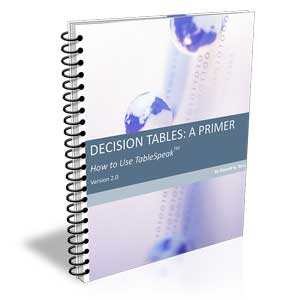Is an Exception a Business Rule?
One of my mentees sent me an FRD to review because her stakeholders were complaining the business rules were confusing. The statements were confusing, and most confusing was that many of the statements were not business rules. My mentee documented all the exceptions from a business process diagram as a list of "…except for…" statements, assuming she had created business rules. She was wrong. Stakeholders are often more comfortable talking about the "not" rather than the "what." A catalog of exception statements is a signal further analysis is needed.
An exception "…is a person or thing that is excluded from the general rule…" whereas a restriction is a "…limiting condition or control…." It is true that that an exception is restrictive, but that does not mean it is a business rule. The exception statement could also be guidance or policy.
A business rule must identify some type of restriction, but it also needs to have the qualities of 'wholeness' and 'independence'. The business rule is 'whole' if understandable by itself (self-explanatory) and can withstand different contexts with same meaning (taken at face value). In addition to being 'whole', the business rule must be 'independent'; the business rule is explicitly expressed; the business rule stands on its own. Often an exception statement is not whole or not independent and will need revision to become a business rule.
Are the statements below valid business rules?
- A sales agent may access the warehouse, except for weekends and holidays.
- A sales agent may access the discounted furniture warehouse, except for days as defined by the rules in the Sales Agent Access Warehouse Business Process Diagram.
- A sales agent may access the discounted furniture warehouse only when the furniture store showroom is in operation.
Statement 1. A sales agent may access the warehouse, except for weekends and holidays.
Which warehouse is being referred to? Which holidays apply: federal, state, city, organization — all or some? The statement may lead to more "except for" statements because it is not self-explanatory, and it cannot withstand different contexts. Statement 1 is not whole and is not a business rule.
Statement 2. A sales agent may access the discounted furniture warehouse, except for days as defined by the rules in the Agent Access Warehouse Business Process Diagram.
This statement is also not a business rule because it does not stand alone; the rules are implied by reliance on another document. The statement lacks independence and is not a business rule.
Statement 3. A sales agent may access the discounted furniture warehouse only when the furniture store showroom is in operation.
Notice the entire statement is revised without the 'except for'. The statement is self-explanatory within different contexts, so it is 'whole'. The statement stands by itself, so it is 'independent'. If the furniture store showroom closes for the weekend, for a holiday, or for repairs during a week day, it is clear the sales agent is not allowed access to the discounted furniture warehouse.
Business analysts should be wary of exception statements… no exceptions!
# # #
About our Contributor:
Online Interactive Training Series
In response to a great many requests, Business Rule Solutions now offers at-a-distance learning options. No travel, no backlogs, no hassles. Same great instructors, but with schedules, content and pricing designed to meet the special needs of busy professionals.












